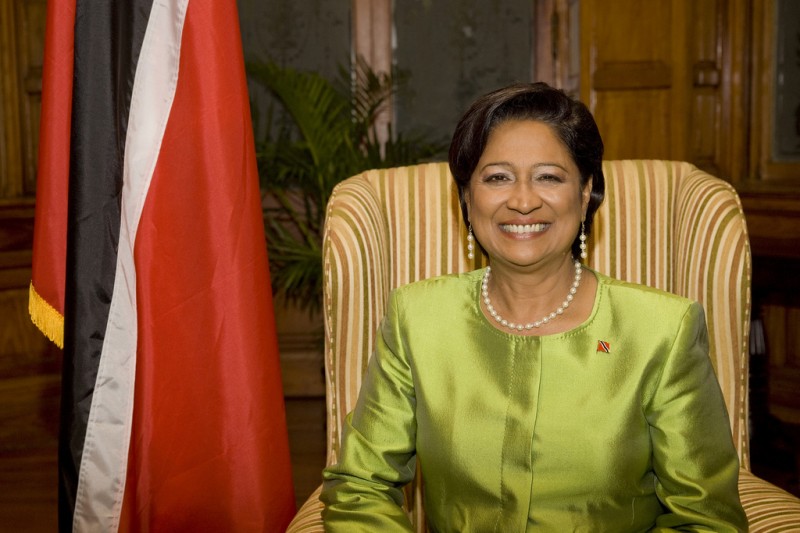 [1]
[1]Trinidad and Tobago's Prime Minister Kamla Persad-Bissessar. Photo taken from The Commonwealth's flickr page. Used under a CC BY-NC 2.0 license.
Trinidad and Tobago's Prime Minister Kamla Persad-Bissessar [2] has tabled constitutional reform [3] to the country's Parliament that would include a ten-year term limit for the office of prime minister (consecutive or not), the right to recall members of Parliament, and automatic run-offs when no candidate has more than 50 percent of the vote.
Many are observing this move with a healthy dose of skepticism. The People's Partnership (a coalition arrangement among various political parties headed by Persad-Bissessar) had outlined constitutional reform as a priority when they ran against the incumbent People's National Movement [4] in 2010, but is only just getting around to doing anything about it. With general elections due next year and labour strikes [5], corruption scandals [6], escalating crime [7] and concerns about the country's security forces overstepping their bounds [8] a reality, this sudden interest in reforming the country's constitution — ostensibly to put more power in the hands of the people — reads to some like an act of desperation. Some suggest that it is an attempt to boost the government's approval ratings [9] before citizens go to the polls, while others see more sinister motives.
The watchdog group [10] SpeakOutT&T, which enjoys [11] more than 10,000 likes on Facebook, questioned the timing of the proposal:
Prime Minister Persad-Bissessar wants to distract us from the embedded corruption of senior officials of her Govt in the $400M LifeSport programme […] so she has now come up with a half-arsed ‘Constitutional Reform’ distraction to get us all outraged and talking again.
Folks, by now you should realize there is a common pattern here. Every time there is a scandal with this government, another DISTRACTION comes up. But this time they're hoping this distraction could benefit them. […] Anyone who has any shred of common sense can very easily rip the inadequacies of the proposed changes apart. It's nothing but a shoddy attempt at trying to regain marginals that you lost or will not win.
The Eternal Pantomime, a blog which keeps a close eye on politics, admitted that it was wary of the government's intentions, but was even more concerned about the section dealing with run-off elections [12]:
Third parties traditionally have the most impact in marginal seats, the majority of which are along the East-West corridor. Although, for a brief period, Jack Warner’s ILP looked like it could make inroads into the UNC support base, [see Global Voices’ coverage here [13]] it now seems to have lost steam. Third parties and independent candidates also tend to offer alternatives to members of the electorate that are tired of the predatory politics currently on offer.
The blogger, Rhoda Bharath, foresaw a few challenges with the proposed constitutional amendments: voting along ethnic lines could become even more well rooted [14]; any contender from outside a well-entrenched political party would need deep pockets to give the major players a run for their money, thereby limiting the electorate's options; and there would be a delay — as much as 15 days after a general election — “for winners to be announced, a Prime Minister to be appointed and a Cabinet to be sworn in, regardless of the fact that in essence we would have already selected a winner by casting votes.”
On Twitter, the reaction was mixed:
Don't be fooled: the PM's submissions on constitutional reform only serve to consolidate the two party system. #trinidad [15] #politics [16] @msjtnt [17]
— Mark Langat (@MKLangat) August 5, 2014 [18]
“Constitutional reform is a distraction” smh I like idea of proportional representation, term limits & recall. #Trinidad [19]
— Samuel Mohammed (@samuelmohammed) August 5, 2014 [20]
Interestingly, Trinidad and Tobago's close neighbour, Barbados, seemed to think the twin island republic is in an enviable position. Barbados Underground, one of the country's popular political blogs, wrote [21]:
Barbadians were promised a Republican form of government in 2005 under a Barbados Labour Party government, 10+ years later this promise among others made by elected officials remain unfulfilled. It is a problem Barbadians have become frustrated by […] reflected in the increasing number of eligible voters who have deliberately not exercised their right to vote […]
In the face of evidence that any system is not working efficiently, sensible managers of the system will make changes. […] Yet we continue to hold up a system that is falling short as sacrosanct. Who will bell the cat? […] Against the background that change is needed to make our political system more relevant, the Kamla Persad-Bissessar Trinidad and Tobago (T&T) led government decision to propose constitutional reform is noteworthy. The T&T experience has been eventful compared to Barbados but there is no reason why learnings from T&T should not engineer proactivity on our part.
With the many missteps of the current administration [22], Trinidadians and Tobagonians may not exactly feel the same way.